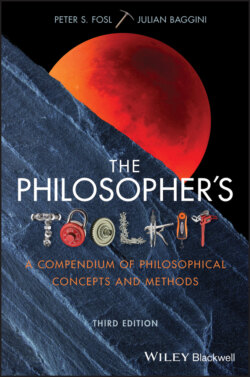Читать книгу The Philosopher's Toolkit - Julian Baggini, Julian Baggini - Страница 81
The sceptical problem
ОглавлениеThe main problem, philosophically speaking, thinkers face is in establishing that it is in fact impossible for any candidate for certainty to have a different truth value. Sceptical thinkers have been extremely skillful in showing how virtually any claim might possibly be false even though it appears to be true (or possibly true though it appears to be false). In the wake of sceptical scrutiny, many agree that absolute certainty in advancing truth claims remains unattainable. One reason for this is the question of whether or not one must be certain that one is certain. (Can you be sure that you’re really sure?)
These are serious though perhaps not insurmountable problems for certainty. For many they present deep sceptical trouble for anyone interested in apprehending truth. On the other hand, clearly not all that’s true is certain. So, perhaps certainty isn’t required for making truth claims or claims to having acquired knowledge. Is there a way to leave the problems of certainty behind and still confidently determine uncertain truths? What is the next best thing if we give up on certainty? To give a proper answer to this question would require a much larger study of epistemology or the theory of knowledge. But for the sake of our concerns here, consider the answer that’s most commonly advanced: probability.
Probability is the natural place to retreat to if certainty becomes intolerably problematic. What is merely probable also seems the largest fraction of human epistemic life. As John Locke writes in his 1689 Essay Concerning Human Understanding: ‘the greatest part of our concernments’ are ‘only the twilight, as I may so say, of probability’ (4.14.2). As a refuge, however, probability is rather like the house of sticks to which the little pig flees when the wolf arrives at the door of his straw house. Probability faces vulnerabilities of its own.
